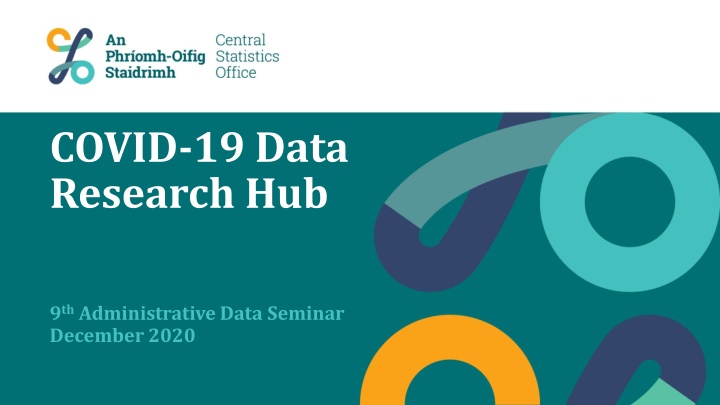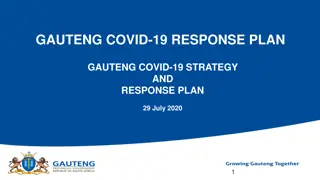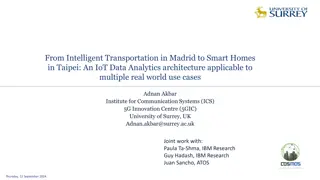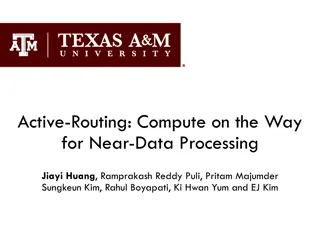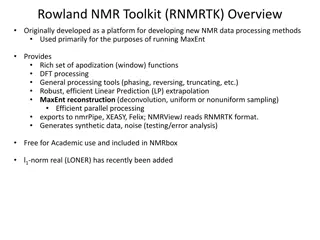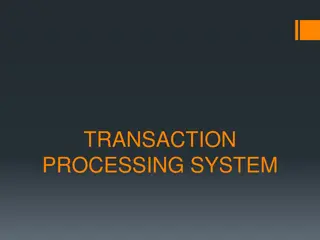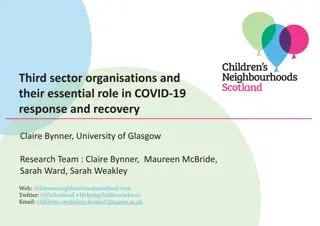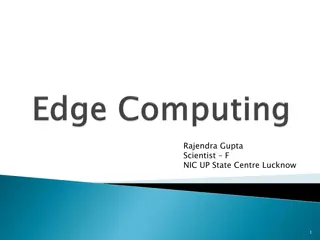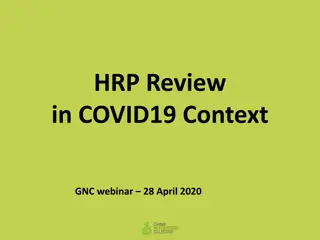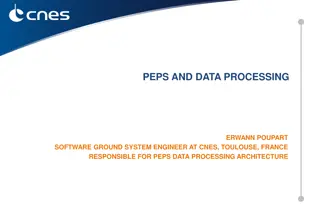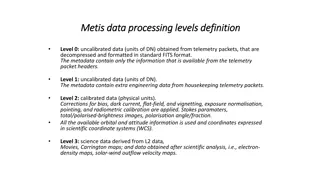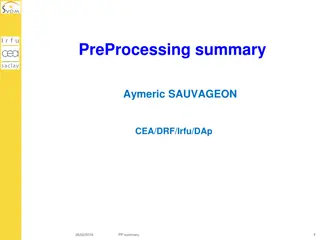Insights into Data Research and Processing Challenges in COVID-19 Response
The data seminar explored the importance of data sharing and collaboration for effective decision-making in managing the COVID-19 pandemic. It highlighted the challenges of processing diverse data sources from various healthcare units and emphasized secure data handling procedures. The need for innovative approaches in data collection, analysis, and sharing was underscored to enhance public health response strategies.
Download Presentation

Please find below an Image/Link to download the presentation.
The content on the website is provided AS IS for your information and personal use only. It may not be sold, licensed, or shared on other websites without obtaining consent from the author.If you encounter any issues during the download, it is possible that the publisher has removed the file from their server.
You are allowed to download the files provided on this website for personal or commercial use, subject to the condition that they are used lawfully. All files are the property of their respective owners.
The content on the website is provided AS IS for your information and personal use only. It may not be sold, licensed, or shared on other websites without obtaining consent from the author.
E N D
Presentation Transcript
COVID-19 Data Research Hub 9thAdministrative Data Seminar December 2020
Civil Service Excellence and Innovation Data and Insights - Excellence in data sharing driving significant efficiencies; facilitating insight driven decision making; and increased openness and transparency between Government and the public. 2
Need for Data, Collaboration and Analysis HSE collecting data on Hospital and ICU beds, Testing, Cases and Patients NPHET bringing together Data Modelling Experts from UCD, NUI Maynooth, Department of Health, etc CSO could provide the infrastructure to bring them together safely and quickly, via the ADC and RCU 3
Section 1: Collecting the Data
Medical Records New territory for CSO Under the Statistics Act (1993), Medical Records are a special category, requiring agreement from the Minister for Health Record level data needed to create effective models Worked with HSE and DoH to identify potential data sources which would address NPHET s data needs Mix of existing data sources, and new ones developed to respond to Covid19 5
Data Flows provided SwiftQueue Testing and Assessment data Computerised Infectious Disease Reporting (CIDR) Covid Care Tracker Hospital Inpatient Enquiry (HIPE) Discharge data Hospital Cases admission data (TrolleyGAR) National Office of Clinical Audit (NOCA) ICU data 6
Data Processing Challenges All coming from different HSE Units Incomplete metadata, need for subject matter experts Daily data deliveries, of sometimes unstable data flows Lack of common identifiers Name and Address fields used for general free text 7
Data Processing Procedure Data encrypted and transferred to CSO by secure SFTP Data read into SAS and on to ADC Source Tier Identifiable variables, such as Name, Address, removed, Id Numbers, eg IHI, MRN hashed. Put on Analysis Tier where CSO linkable identifiers, eg CSOPPSN added where possible File converted to csv and put on RCU server for researcher access 8
Section 2: Data Governance
GDPR never sleeps Paperwork was done in parallel with data collection Data was collected under Section 30 of the Statistics Act A Section 11 partnership was put in place Researchers were appointed as Officers of Statistics A Data Protection Impact Assessment (DPIA) and associated documents were prepared 10
Five Safes Project Is the use of the data appropriate? People Can the users be trusted? Setting Does it limit unauthorised use? Data Is the data a disclosure risk? Outputs Are the results non-disclosive? 11
Section 3: Outputs and Results
Research and Statistical Outputs Epidemiological research by members of the Irish Epidemiological Modelling Advisory Group Modelling of pandemic data by this group, including calculation of the R rate Development and evaluation of the success of policy responses via support for policy analysts Tracking the incidence levels nationally and locally, via support for the COVID 19 Data Hub on the Ordnance Survey Ireland Geohive platform Information on capacity issues in hospitals, testing, contact tracing and referrals Official statistics and public information on all aspects of the COVID crisis in subsequent CSO analysis 13
National Data Infrastructure (NDI) Underscored the importance of Permanent Identifiers Individual Health Identifier (IHI) available on some flows, Patient Id or Covid Id on others Lack of Eircodes results in manual coding of Geography Even Hospital Id number is different in various sources Improvements have been made over the course of 6 months 16
